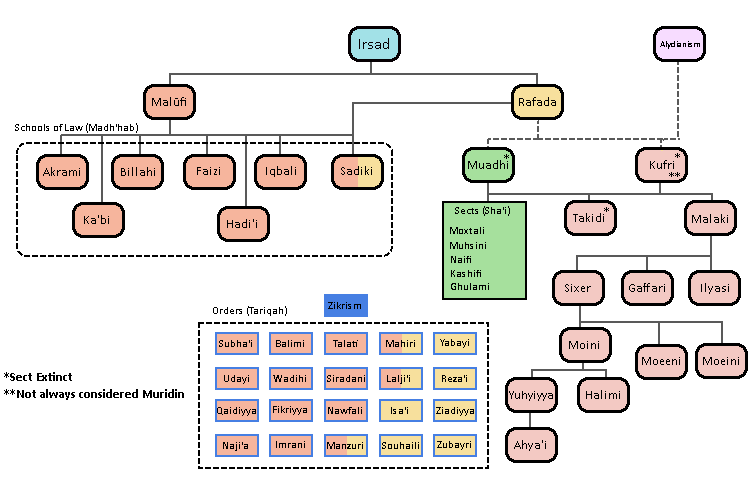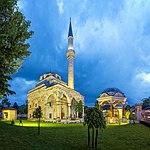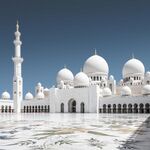Irsad
This article or section is in the process of an expansion or major restructuring. You are welcome to assist in its construction by editing it as well. If this article or section has not been edited in several days, please remove this template. If you are the editor who added this template and you are actively editing, please be sure to replace this template with {{in use}} during the active editing session. Click on the link for template parameters to use.
This article was last edited by Finium (talk | contribs) 14 months ago. (Update timer) |
| Irsad | |
|---|---|
 The Gheiravic word 'Allah' or 'God' within a Crescent as a symbol of the Irsadic faith. | |
| Type | Monotheistic |
| Scripture | Nashwad (The Chants) |
| Polity | Ummah (The Community) |
| Governance | Khilafa (Caliphate) |
| Caliph | Sultan Azamat Nuruddin |
| Associations | Universal Irsadic Cooperative Congress (UICC) |
| Region | Arabekh, Majula, Catai |
| Headquarters | Halif State |
| Founder | Prophet Mubashshir al-Mahdī |
| Origin | 92 BCE Sulh, Catai |
| Church buildings | Masjid (Mosque) and Mazār (Shrine) |
| Tertiary institutions | Madrasah |
| Other name(s) | Al-Hudan, Al-Hilam |
All is in the Name of God, the Most Good, the Most Generous. | |
Muridin believe that Irsad is the original, complete and universal version of a primordial faith that was revealed many times before through prophets, restored from its corrupted form by Mubashir. As for the Nashwad, Muridin consider it to be the unaltered and final revelation of God. Religious concepts and practices include the Creed of Irsad, which are five principal and obligatory acts of worship, and following Irsadic law, which touches on virtually every aspect of life and society, from banking and welfare to women and the environment. Certain religious rites and customs are observed by the Muridin in their family and social life, while social responsibilities to parents, relatives, and neighbors have also been defined. Besides, the Nashwad and the teachings of Prophet Mubashshir prescribe a comprehensive body of moral guidelines for Muridin to be followed in their personal, social, political, and religious life.
Irsad began shortly before the Common Era. Originating in Meccat, it quickly spread in Central Arabekh and by the 10th century the Irsadic Empire was extended from West Arabekh to the Majulan Ocean in the east. Its Golden Age refers to the period traditionally dated from the 4th century to the 9th century when much of the historically Irsadic world was experiencing a scientific, economic and cultural flourishing. The expansion of the Muridene world involved various caliphates and empires, traders and conversion to Irsad by missionary activities. In the present, the Khilafa or Irsadic Caliphate is lead by the Kodeshi Sultan Azamat Nuruddin who henceforth acts as its spiritual leader and primary guide in the temporal world.Etymology and Meaning
Faith and Principles
God
As a being, God is recognsed as the all-powerful and all-knowing creator, sustainer, ordainer and judge of everything in existence. It is composed of two distinct but connected entities (Asira and al-Maqqa), but is strictly singular (tawḥīd), unique (wāḥid) and inherently One (aḥad). According to Irsadic teachings and to the Nashwad or Nasheed, "No vision can grasp God, but God's grasp is over all vision: God is above all comprehension, yet is acquainted with all things." Though God has a multitude of names within the faith, the most familiar and frequent of these names are "the Most Good" and "the Most Generous". Creation and ordering of the universe is seen as an act of prime mercy for which all creatures sing God's attributes and bear witness to God's unity.
Asira, the feminine manifestation of God's creation, and al-Maqqa, the masculine manifestation of God's destruction, are aspects (Gheiravic: مظهر; mazhar) of God and are considered to be distinct from one another but inseparable from God. Their depiction varies depending on Order (tariqah) and Sect (sha'i) but the Nashwad teaches that like God they are formless and exist with him outside of time and reality.
Muridin believe that the creation of everything in the universe was brought into being by God's sheer command, "Be, and it is" and that the purpose of existence is to understand God and its creation. It is viewed as a personal god who responds whenever a person in need or distress calls them.Divine Revelation
Acts of Worship
Law
Society
Etiquette and diet
Many practices fall in the category of adab, or Irsadic etiquette. This includes greeting others with "as-salamu 'alaykum" ("peace be unto you"), saying bismillah ("in the name of God") before meals. Irsadic hygienic practices mainly fall into the category of personal cleanliness and health, both in religious practice and everyday life. Circumcision of male offspring is not mandatory in Irsad, but neither is it prohibited, and is practiced by some Irsadic communities but not by most. Irsad has no approved type of burial, with cremation becoming increasingly common in the modern age. Irsadic burial rituals, include saying the Salat al-Janazah ("funeral prayer") during the cremation or burial.
Irsad does not have particularly restrictive dietary practices, with only carrion being proscribed outright. All meat should come from a herbivorous animal slaughtered in the name of God by a Muridin, with the exception of game that one has hunted or fished for oneself. Meat from carnivorous fish is permitted, as is meat from carnivorous animals if no other meat is available. Exceptions to the rules are permitted if the well-being of the Muridin is affected. The slaughtering of animals is highly regulated; they must feel no pain and expect to feel no pain (i.e. they must be stunned), and must face the direction of Sulh as they are given their funeral prayer. Food permissible for Muridins is known as halal food.
History
Denominations
Malufi
The largest denomination in Irsad is Malufi Irsad, which makes up 75%–90% of all Muridins. Malufi Muridins also go by the name Ahl al-Malufi which means "people of the correct way [of Mubashir]".
Malufis believe that the Caliphs were the rightful successors to Mubashir; since Mubashir instructed his followers to elect a steward to protect the community. Malufis believe that anyone who is righteous and just could be a caliph but they have to act according to the Nashwad, the example of Mubashir and give the people their rights, otherwise they can be deposed.
Malufis follow the Nashwad and the Hikayat [al-Mubashir], which are recorded in tales of Mubashir's life, as recorded or told by his companions, known as Al-Kutub Al-Thamania (eight collections). For religious matters derived from the Nashwad, many follow six malufi and one shared madh'habs (schools of thought): Akrami, Billahi, Ka'bi, Faizi, Hadi'i, Iqbali, and Sadiki. All seven accept the validity of the others and a Muridin may choose any one that he or she finds agreeable. Ahl al-Hikayat is a movement that emphasizes sources of jurisprudence outside the Nashwad, such as informed opinion (ra'y), and from the tales of Mubashir's life (the Hikayat).
Rafada
The Rafada (Rafada al-Khilafa lit. Rejecters of the Caliphs) possibly constitute 10–20% of Irsad and are its second-largest branch, though their status as a branch is sometimes contested.
While the Malufis believe that a Caliph should exist and be elected by the community, the Rafada reject the idea of the Caliph entirely. As a result they believe that every Caliph since Abu al-Mustafa has been incorrect in assuming the duties once exercised by Mubashir. They contend that Mubashir is the eternal leader of the community and as such no steward in religious aspects is needed.
Despite the difference in this core doctrinal belief, the Rafada and Malufi differ very little in doctrine and conversion between the two is not uncommon. The Rafada form the core of the Ahl al-Hikayat movement and many hold the Hikayat as being near important as the Nashwad. For religious matters derived from the Nashwad, they may follow the six malufi madh'habs, but many choose to follow the Sadiki madh'hab which tends to cater more towards their beliefs.
Due to their doctrinal similarity to Malufis, and general rejection of any label given to them without context, they are sometimes grouped with malufis.
Muadhi
The Muadhi constitute less than 15% of Irsad and are formed from the teachings of the 6th-century spiritual leader Ibn Muadh. They are primarily concentrated in Hisaristan and Gholestan, where they form a majority of the population.
Muadhis believe that Ibn Muadh, patrilineally descended from the Prophet, possessed the spiritual essence (روح rūḥ, literally spirit, essence) of Mubashir and could therefore commune with him and gain new revelations from Allah. This essence could be passed on within his line but only to those considered righteous and just enough to be given heavenly audiences with Mubashir. As a result the movement quickly split into various branches following different lines of descent from Ibn Muadh.
Muadhi practices such as veneration of Ibn Muadh and ritual seances have faced stiff opposition from more orthodox Muridins, who have sometimes historically and in the modern day physically attacked Muadhi places of worship, leading to deterioration in Muadhi–Mulafi relations. This has led to Muadhis often following the controversial doctrine of taqiya (تقیة taqiyyah, literally "prudence, fear") to conceal their religion when persecuted.
Rohollahi
Rohollahism is a syncretic faith concentrated among the Gholan peoples of west Catai which has roots in Muadhism, Zikrism, and Pre-Irsadic Gholan religions. Despite its Muadhi roots the faith is recognised as being founded by Sheikh Arash Shah, one of Ibn Muadh's disciples, in the years following Ibn Muadh's death. There are many branches of Rohollahism, each centred on different spiritual chains and claimants to the Imamate.
Rohollahist beliefs are centred around a trinitarian and esoteric interpretation of Irsadic theology, which divides Allah into three aspects. These are Allah - the creator god and lord of all existence, Imam - the human manifestation of divine knowledge, and Roh-e-Haqq - the "soul of divine truth" which guides people in their search for wisdom. The aim of Rohollahism is to reach a state of unity with the divine through Meditation and contemplation of religious doctrine. They hold that the Roh-e-Haqq is the source of all knowlegde, and through love of God and looking within oneself for the truth one can open their soul to Roh-e-Haqq and gain knowledge of divine reality. Meditation utilises tanbur music, chanting of mantras, dancing, and other techniques aimed at reaching a state of spiritual ecstasy where one comes closer to God.
A key concept of Rohollahism is the idea of the Imamate. The Imam is the temporal personification of Roh-e-Haqq in the material world and is tasked with guiding humanity religiously. There is only one Imam at any one time and the position is passed down through transfiguration of the soul, with a pious and wise Rohollahi Sheikh inheriting the position during meditation. This is different from divine inspiration, which is available to all humans. Rohollahists believe that Mubashir was divinely inspired, but that in his limitation of the truth to an exoteric lifestyle and faith he was misguided. They hold that Ibn Muadh was the first of the revealed Imams, as he was the first to comprehend and explain the concept of Rūḥ. This veneration of Ibn Muadh and derision of Mubashir has led to the Rohollahi being considered infidels by most Muridin clerics.
Shurawiyyah
The Shurawi Order is a Muadhi holy order founded by Ramazan al-Amin in the Hisari city of Rukhmeydan in 1902. It is one of the largest Muadhi movements, although it is largely confined to Hisaristan where Shurawi shrines, spiritual lodges, and theological colleges can be found across the country. Shurawi masjids, common in Hisari cities, often provide community services and organize local assemblies known as shuras from which the name of the Order is derived. Shurawi adherents are widespread among the ranks of the Imperial Army and urban workers across Hisaristan.
Shurawis hold that the material world and our perception of it derived from wujud - the absolute and infinite reality of God. All things are finite and limited while God is infinite and unlimited. All things borrow wujud from God and are thus both God and other than God. This applies to the sense of self, which comes from consciousness, itself a manifestation of the soul. When a person is reunited with God, they were still of both divine and material origin: they might become one with God, but they will never become Him because their consciousness is Him and other than Him, the latter constituting their individual sense of self.
Consequently, Shurawis argue, humans, as reflections of God, are one with Him. When someone searches for their oneness with God, they are reunited with Him and attain the highest form of consciousness - self-realization. When they do so, they come to understand their place in the universe as a manifestation of the divine, fulfilling God's desire to be known and allowing them to convey the spirit of the universe.
However, Shurawis differ from most Muadhis in that they hold that reunion with God requires more than individual reflection - it requires a sense of moral righteousness that is defined as compassion for others and an innate rejection of injustice in all its forms. According to al-Amin, God gave us the material world and the gift of consciousness so that we could choose to fulfill our spiritual potential. However, the strong coerced the weak and evil in its avarice turned humanity away form the righteous path. Along with the Prophet Mubashir, twelve Muadhi saints and twelve social reformers were guided by God to reveal his message to humanity so that it could choose to redeem itself.
To Shurawis, the Madhi is not a person - he is an allegory - a representation of the ummah. Every Muridin is considered to have a responsibility to themselves and to others to fight the forces of avarice. As a result, Irsad itself is viewed less as a faith and more as a movement destined to restore the world to justice.
Kufri
The Kufri constitute around 5% of Irsad, though their status as Muridins is sometimes internally and externally denied. Their name derives from the exonym Ahl al-Kufri which means "people of disbelief [of Mubashir's ways]".
Most Kufri sects are seen as a blend of local beliefs, Irsadic Rafada doctrine, and Alydianism. As a result many of the sects beliefs are highly divergent from mainstream Irsad and from each other. They have historically been persecuted in the Muridin world as Iktira'at (اِخْتِرَاعَات iḵtirāʿāt, literally innovators, fabricators), though not all sects have adopted the taqiya doctrine and some openly condemn it.
Kufris belong several branches, the most prominent being the Sixers (the largest branch), Yuhyiyyas and Ilyasis. The Sixers believe in six ages each with a prophet sent by God, that Alid was the fourth, Mubashir the fifth, and that mankind is currently in the sixth epoch and awaiting the sixth and final messenger. Yuhyiyyas are doctrinally similar, but believe that each prophet is a reincarnation of the human essence of God. Ilyasi beliefs are not very well understood, owing to the extreme secrecy and tribal nature of their sect, but seem to revolve around a dualism of linked gods represented by Alid and Mubashir. The Takidi were historically a major sect, but in the 5th century they were reconciled with the mulafi position after intense persecution and conversion missions.
Demographics
Culture
Architecture
One of the most important expression of Irsadic architecture is that of the masjid and mazār, which are found in Irsadic countries and most countries with an Irsadic community. Masjids are often influenced by various cultures, though they tend to share certain design patterns which make them universally recognisable. Mazārs lack a universal structure and tend to be far more varied in influence and design, though many take inspiration from the original Manzil al-Nabi'i Shrine, which houses the remains of the Prophet Mubashir in Sulh, Fahran.
Great Mosque of Alp Altan, in the west Cataian country of Kodesh
Manzil al-Nabi'i Shrine, in the west Cataian country of Fahran
Great Mosque of Ibn Muadh, in the west Cataian country of Qaradag
The White Mosque, in the west Cataian country of Qal'eh




